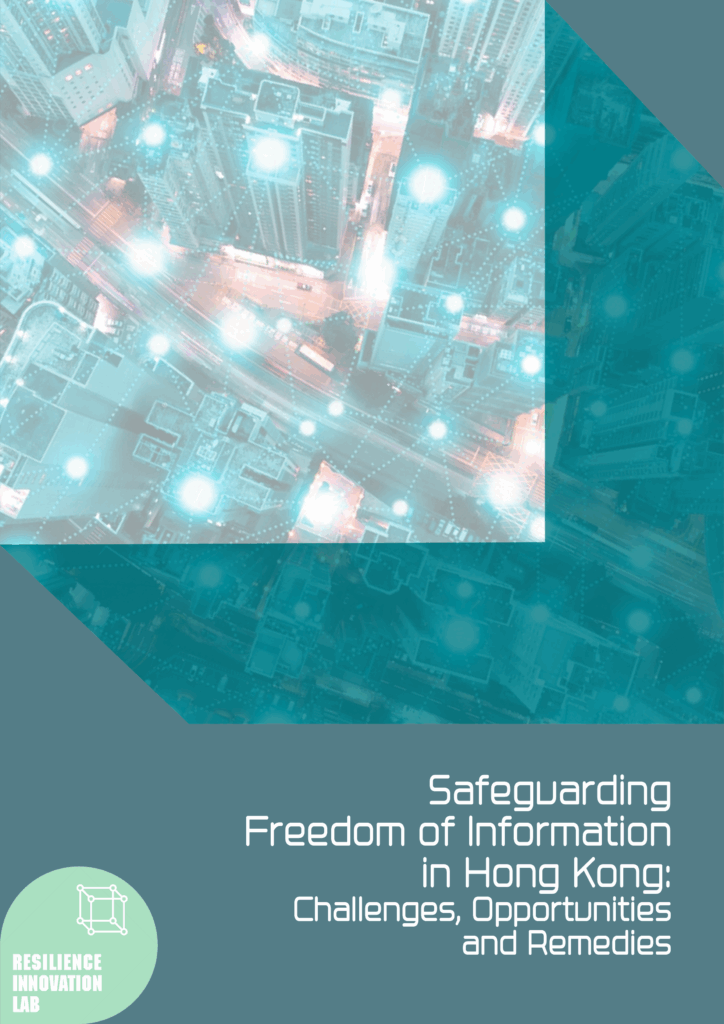Resilience Innovation Lab is pleased to launch a new report, ”Safeguarding Freedom of Information in Hong Kong: Challenges, Opportunities and Remedies”. Both Chinese and English versions of the full report are now available online.
Download the Chinese version of the report here.
Download the English version of the report here.

Freedom of information is a cornerstone of democracy and good governance, enabling transparency, accountability, and public trust. In Hong Kong, information access has been increasingly restricted, particularly following the enactment of the Hong Kong National Security Law (HKNSL) in 2020 and the Safeguarding National Security Ordinance (SNSO) in 2024. These measures have significantly curtailed press freedom, civil society oversight, and public access to government data, diverging from international human rights standards.
The increasing criminalisation of information access in Hong Kong has led to weakened transparency, press suppression, and reduced corporate data availability. The impact extends beyond journalists to businesses, researchers, and international organizations. Legal reforms, stronger civil society engagement, and international accountability measures are necessary to restore freedom of information and Hong Kong’s reputation as a global financial and information hub.
Against this background, this report explores the current state of information freedom in Hong Kong, the challenges faced, and the path forward in ensuring an open and informed society. Key findings and remedies are provided as follows:
Key Findings
- Legal and institutional barriers: Hong Kong lacks both an Archive Law and a Freedom of Information Law, leading to government opacity and arbitrary record destruction.
- Press freedom erosion: Journalists face censorship, visa denials, harassment, and arrests, resulting in self-censorship and media retreat from Hong Kong.
- State control over information supply chain: The government has increased public data removal, rejected information requests, and imposed court injunctions to suppress access to critical information.
- Legal repercussions for information access: Ambiguous definitions of “state secrets” and “espionage” in the SNSO expose researchers, businesses, and journalists to potential prosecution.
- International business and investment risks: Restrictions on financial data transparency and extraterritorial application of security laws undermine Hong Kong’s attractiveness as an international business hub.
Remedies
For the Legal System:
- Enact Archive Law and Freedom of Information Law in compliance with ICCPR and international best practices.
- Reverse court decisions that restrict free access to information, including the ban on the protest song Glory to Hong Kong.
For the Executive Government:
- Cease enforcing censorship policies, information removals, and national security laws that restrict information access.
- Implement UN recommendations to repeal or amend the HKNSL and SNSO to align with international human rights obligations.
- Protect journalists, researchers, and civil society members from harassment and legal intimidation.
- Improve existing legal and regulatory frameworks in light of latest UN standards and principles on access to information
For Business Corporations, Chambers & Investors:
- Advocate for clear definitions of state secrets to ensure market transparency.
- Strengthen corporate policies against compliance with excessive government data requests.
- Maintain transparency reports on information requests from the Hong Kong authorities.
For Civil Society:
- Strengthen networks of support for Hong-Kong-based journalists and researchers.
- Utilize censorship-resistant technologies (e.g., blockchain, IPFS) to safeguard public data and digital archives.
- Provide adequate resources and trainings to groups that sustain and contribute to the information supply chain in Hong Kong
For International Organizations:
- UN agencies and human rights bodies should monitor and report on the state of information access in Hong Kong.
- Strengthen international diplomatic pressure on China and Hong Kong to uphold information integrity and human rights.
韌性創新實驗室(Resilience Innovation Lab, RIL)很高興正式發佈研究報告,標題為《維護香港資訊自由:挑戰、機會與出路》。中文版及英文版的完整報告現已上線:
報告全文(中文版):按此下載
報告全文(英文版):按此下載
資訊自由乃民主與良治之基石,促進透明度、問責及公眾信任。自2020年《港區國安法》(HKNSL)及2024年《維護國家安全條例》(SNSO)實施以來,香港的資訊存取空間明顯受限。這些措施嚴重限制了香港的新聞自由和公民社會監督政府的功能,鼓勵政府隱沒本可開源的公共數據,偏離國際人權標準。資訊存取和傳播日益刑事化,導致政府透明度下降、媒體被壓制及降低企業數據可獲性,影響波及記者、商界、研究人員及國際組織。
香港資訊自由的退步反映透明度、問責及開放治理的廣泛倒退。當局必須進行法律改革,增強行政與立法透明度;商業界與國際社會亦應共同努力維護香港資訊自由及言論自由,以恢復並保障香港的長期穩定、經濟競爭力及全球地位;關注香港的持份者務須增強公民社會參與及加強國際問責,以恢復香港資訊自由和其國際金融及資訊樞紐的聲譽。
本報告的主要論點和論據如下:
- 法律及制度障礙:香港缺乏檔案法及資訊自由法,導致政府不透明及任意銷毀紀錄。
- 新聞自由受侵蝕:記者面臨審查、簽證被拒、騷擾及逮捕,導致自我審查及媒體撤出香港。
- 國家對資訊供應鏈的控制:政府增加數據移除、拒絕資訊要求,並透過法院禁制令壓制重要資訊的存取。
- 存取及傳播資訊的法律後果:《維護國家安全條例》對「國家機密」及「間諜活動」的模糊定義,使研究人員、商界及記者面臨潛在起訴。
- 國際商業及投資風險:金融數據透明度的限制及安全法例的域外應用威脅香港作為國際商業中心的吸引力。
補救措施:
- 法律制度:制訂符合國際標準的檔案法及資訊自由法;終審法院撤銷(推翻?)限制資訊自由的法庭裁決。
- 行政當局:停止審查政策及移除公共資訊;執行聯合國建議,修改或廢除違反國際人權義務的國家安全法例。
- 商界、商會及投資者:倡議清晰定義國家機密;強化企業政策,抵制政府過度的數據要求;定期發布有關政府資訊要求的「透明度報告」。
- 公民社會:加強對香港記者及研究人員的支援網絡;採用抗審查技術保障公共數據及數位檔案。
- 國際組織:聯合國應監察及報告香港資訊自由情況;加強對中國及香港的外交壓力,保障資訊完整性與人權。
報告全文(中文版):按此下載
報告全文(英文版):按此下載

Comments are closed